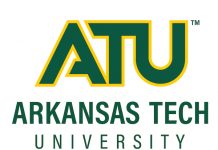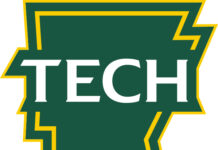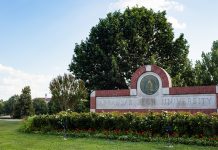It was January 2019. Students in the Arkansas Tech University Society of Automotive Engineers (SAE) organization had a choice to make.
They could refine the existing Wonder Car that reached 212 miles per gallon at the 2018 Shell Eco-marathon Americas challenge in Sonoma, Calif., and return it to the track in 2019.
Or, they could reach beyond the status quo and build a leading-edge vehicle that might allow them to compete with the best of the best.
Seven ATU mechanical engineering students chose the latter path, and the rewards of their grit and ingenuity were great.
ATU’s new and improved car reached 993 miles per gallon April 3-6 in Sonoma during the 2019 Shell Eco-marathon Americas challenge, a 368 percent increase over one year earlier.
As a result, Arkansas Tech finished third among teams from the United States and seventh overall in the internal combustion engine division of what is one of the most prestigious and competitive annual automotive engineering contests in the Western Hemisphere.
“We were rushing pretty hard to get all the goals and deadlines met,” said Justin Duke, team leader and a senior from Beebe, while reflecting on the weeks leading up to the event. “We were feeling fairly confident, but at the same time we weren’t sure because that track (Sonoma Raceway) is different than the one we test on here. We didn’t really know what to expect. I was hoping for 500 (miles per gallon). We first started out on the practice runs hitting 400, and then we bumped up to 600 and 600 again…then 850 and going up to 993 as our best run. Every little adjustment we were making was increasing it pretty quickly.”
Duke was joined on the project by fellow ATU mechanical engineering students Michael Anderson of Casa, Brayden Butler of Hot Springs, Stephen Kajdan of Clarksville, Andrew Lea of Russellville, Justin Stroud of Hector and Jay Wallace of Omaha, Texas.
The team was accompanied on the trip to California by Jacob Weidenfeller, ATU instructor of electrical engineering and lab director.
“We were, I believe, the only team to complete all five runs without breaking down, so that was amazing, especially with a brand new car,” said Duke. “A lot of the other teams have been bringing the same car for four or five years in a row.”
In addition to pursuing fuel efficiency, the ATU team members also had to be efficient with their financial resources.
“The thing I’m most proud about on this car is the budget,” said Duke. “We probably spent around $2,000 on this car. Other teams have large sponsors and they are spending $50,000 or $60,000 on their cars. The price per mile per gallon difference is huge when you compare our car to some of the others.”
All of the team members are seniors with the exception of Lea, a junior who plans on returning to lead the team in 2019-20.
“I definitely wanted to see Arkansas Tech succeed in this competition,” said Lea. “I hope this becomes a legacy car that puts Arkansas Tech in the top tier for the future. I’m trying to come up with the solution to get us into that four-digit club. I want 1,000-plus (miles per gallon). That’s going to be huge. We’re definitely going to increase the engine compression and possibly even lighten the car. I’d like to see 1,500.”
The team was unanimous in its belief that additional financial resources could help the ATU project take the next step and compete for the Shell Eco-marathon Americas challenge title in the future. The winning number in 2019 was 1,525 miles per gallon, which was achieved by Northern Illinois University.
The ATU SAE club will host a car show on Saturday, April 20, to raise funds for the 2019-20 car project. It will take place in the Witherspoon Hall parking lot at 407 West Q Street in Russellville.
Entry in the show is $15 per car. Registration will begin at 9 a.m. and judging will start at noon. The event will also feature door prizes, concessions and T-shirts. More information may be obtained by sending e-mail to kmcbryde@atu.edu.
Watch a THV Channel 11 report about the ATU team’s achievement in Sonoma.





